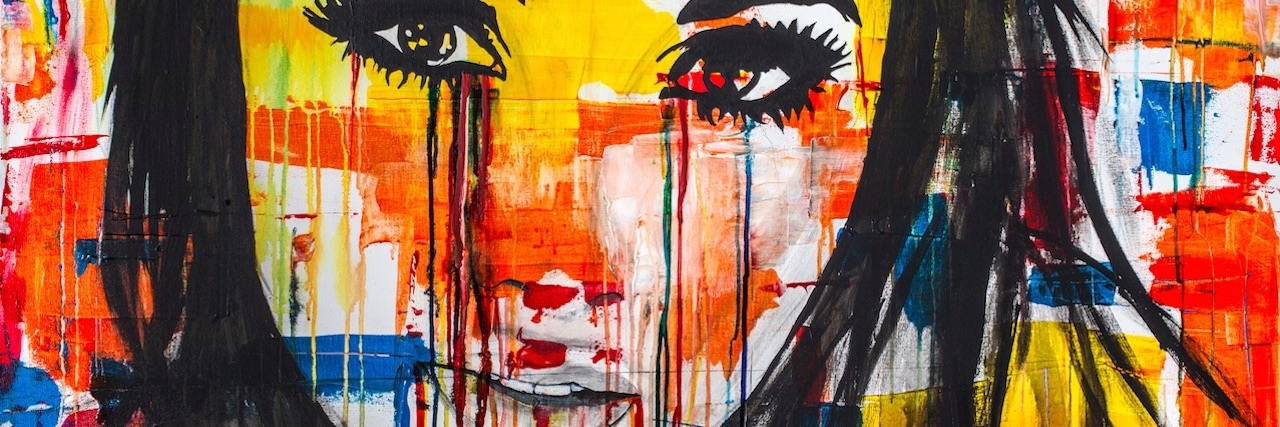What It's Like Living With the Weight of Persistent Depression
When I tell people I have dysthymia, the reaction is generally the same puzzled look on their face as the words of sympathy flow…
“Dysthymia?
Wow, I am so sorry to hear that; is it terminal?”
“Dysthymia?
Sounds awful; it’s not contagious is it?”
“Dysthymia?
Oh, I hear they have a pill for that now.”
Simply put, dysthymia is chronic depression. It is considered a “milder” form of depression than major depressive disorder (MDD) however can be just as, if not more debilitating, as its symptoms usually last much longer than in MDD. Generally to be diagnosed with dysthymia you would have been in a depressive state most of the time for at least two years. The Diagnostic and Statistical Manual of Mental Disorders (DSM-5) decided on a more descriptive label this year and dysthymia is now referred to as persistent depressive disorder.
Now that you have some idea of what the term means, allow me to elaborate on how it feels.
The struggle begins each morning as I open my eyes. By the time I gather the energy to sit up I feel the weight of two elephants balancing precariously on my shoulders. My mind is flooded with thoughts at a rate seeming equivalent to the top speed of a fighter jet. The disappointment and resentment of actually waking up has weighed me down since I was about 5 years old. I know I have done nothing to bring about dying, yet a part of me is saddened by the thought it is not my time quite yet. This is not a fleeting thought — more like a tattoo, with my brain being the canvas. Some days it fades to a dull flicker by the time I have started my morning coffee, others it nags at me until mid-day and on occasion, it casts its dark shadow until I am medicated enough to drift off to sleep. Finally, I accumulate the energy to rise out of bed and begin the day, and another battle in my war against my depression.
I don’t remember a day when my mind and heart didn’t feel heavy.
Now, I am not saying I did not have one but rather that I cannot recall it. The mind has a nasty tendency of burying the good while presenting the negative. I would like to say how carefree and happy my childhood was, as I spent my summer days playing without a concern in the world; or that I could in truth convey to you my school days were memorable; that I was full of confidence and fit it with all, or at least most of my peers, but I would be exaggerating. The truth is I am sure I played and learned with my peers; however, I did those things carrying a dark shadow everywhere I went. It is a shadow that casts darkness over any of the joyous times, taking the “normal” feelings of elation and knocking them down a few levels, to more of forced air of happiness. I won a few awards playing soccer and remember my teammates asking why I never got too excited about my achievements, and so desperately wanting to tell them, “I don’t know any different…this is me happy.”
Dysthymia has burdened me with a constant sense of hopelessness that extends over the majority of areas in my life. It has kept me in a state of “down in the dumps” since early childhood, with its cousin major depressive disorder randomly dropping by, taking down in the dumps to a whole new level — often accompanied by an unquenchable thirst for self-destruction. It has never been “if you hope for the best, it will come” but instead “expect the worst, prepare for the worst.” It has stripped me from the ability to see the glass as half full (for me) and instead not only perpetuated the half empty theory, but solidified it with mental preparations for these possible negatives.
It has taken most of my self-esteem and held it hostage, occasionally teasing me with a possible release yet always locking it back up just in time, which in turn makes decision making a challenge as I am always questioning myself. It amplifies the act of being self-critical. An added bonus includes projection of those criticisms onto anyone around me, and now I assume they must feel the same way about me as I do.
Dysthymia gives me days when I feel tired, old and brittle, as if the lightest breeze could knock me over, or the slightest of touches make me shatter. The sky seems darker despite the rays of sunshine. There are times when I need to be alone so I don’t have to compose my face into some semblance of cheerfulness. These persistent negative emotions vary in intensity but still leave me feeling profoundly different from other people. Like the days of being happy, I cannot elicit memories of a time where I felt like I “fit in” completely, soccer being my one saving graces.
To sum it up, my dysthymia feels like I am walking around holding a weighted umbrella, which is casting a shadow over my head and teasing me with glimpses of sunshine.
Follow this journey on Jody’s blog.
The Mighty is asking the following: For someone who doesn’t understand what it’s like to have your mental illness, describe what it’s like to be in your head for a day. Check out our Submit a Story page for more about our submission guidelines.

